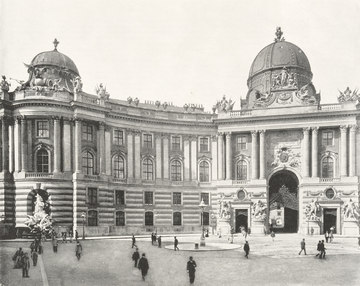-
Story The ‘German-Austrians’
Holding the Monarchy together: The German-Austrians as the guarantors of Habsburg statehood
The Germans had a special role in the Habsburg Monarchy. As the largest language group and the most highly developed in social and economic terms, they were the most important upholders of the idea of the Monarchy as a unified state.
Nevertheless, the Habsburg Monarchy was quite definitely not a ‘German’ state, neither as it was seen from outside nor as it saw itself, as Austria was always very greatly influenced by other ethnic groups.
Accordingly, Austrian state patriotism was supranational in character. The focus was on the dynasty, though less so in Franz Joseph’s later years. Although the Emperor saw himself as a ‘German monarch’, he always maintained a neutral stance in the conflict between the nationalities.
In spite of all the diversity, the German language and culture performed a special function in the Danube Monarchy. Spread far and wide all over the Habsburg lands, the German-speakers – even when they were small in numbers, which was often the case –were a strong economic and cultural force. In addition, they acted as a link between the provinces by virtue of the fact that they staffed the outposts of the central authorities in Vienna. For a long time the German-Austrians were considered the group with the greatest loyalty to the dynasty, because of their overwhelming predominance in the Austrian hereditary domains, which with the capital of Vienna constituted the core of the Habsburg crown lands.
Although German was never the sole official language of the state, it was by far the most important language of commerce and administration. As the lowest common factor between the various language groups of the Monarchy, it also served as a lingua franca amongst the representatives of the various non-German ethnic groups.
It was most especially in the era of Liberalism (1861–1879), when the ground was laid for a new organization of the Monarchy along centralistic lines, that German was regarded as the most important vehicle for the expression of the overall idea of the state.
The language factor thus gave the German elites a privileged position with regard to involvement in political decision-making. Furthermore, the census-based electoral law of the time only granted the vote, and thus involvement in the parliamentary system, to monied individuals from the grande bourgeoisie, from finance or industry, or from the nobility – all groups principally made up of members of the German language group. Conversely, belonging to the social elites also implied a basic loyalty to German culture and the German language.
From 1861 the Reichsrat was thus to all intents and purposes an assembly of German Liberals, in other words a selection of notables drawn from the German-speaking elites. Most of the other nationalities, which were grossly under-represented, obstructed the parliamentary system as a sign of their rejection of the goals of German-oriented centralism.
Towards the end of the nineteenth century, however, this situation changed dramatically. The emancipation from German hegemony of the smaller peoples of the Habsburg Monarchy led to them rapidly catching up with their former masters and greatly expanding their political role. Their ever more confident demands disrupted the primacy of the Germans, whose dominant position was no longer taken for granted.
Translation: Peter John Nicholson
Kann, Robert A.: Die Habsburgermonarchie und das Problem des übernationalen Staates, in: Wandruszka, Adam/Urbanitsch, Peter (Hrsg.): Die Habsburgermonarchie 1848–1918, Band II: Verwaltung und Rechtswesen, Wien 1975, 1–56
Rumpler, Helmut: Eine Chance für Mitteleuropa. Bürgerliche Emanzipation und Staatsverfall in der Habsburgermonarchie [Österreichische Geschichte 1804–1914, hrsg. von Herwig Wolfram], Wien 2005
Stourzh, Gerald: Die Gleichberechtigung der Nationalitäten in der Verfassung und Verwaltung Österreichs 1848 bis 1918, Wien 1985
Sutter, Berthold: Die Deutschen, in: Wandruszka, Adam/Urbanitsch, Peter (Hrsg.): Die Habsburgermonarchie 1848–1918, Band III: Die Völker des Reiches, Wien 1980, Teilband 1, 154–339
-
Chapters
- The German-Austrians in the Habsburg Monarchy
- German Austrians or Austrian Germans?
- Holding the Monarchy together: The German-Austrians as the guarantors of Habsburg statehood
- In search of the Fatherland: The genesis of the German nation
- To join or not to join? Austria and the process of German unification
- Fear of losing hegemony: The German-Austrians in the Austrian multi-national state
- The radical German nationalists and their attitude to the Habsburg Monarchy
- The concept of ‘German Central Europe’





